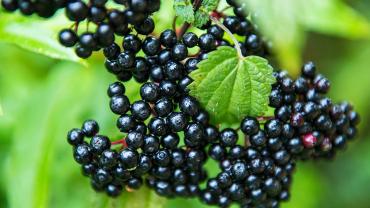
Elderberry (Sambucus nigra) is a botanical commonly known for its role in support of immune health. It contains many bioactive molecules that act in multiple biochemical pathways within the body. For instance, flavonoids derived from S. nigra have been shown to inhibit H1N1 influenza virus host entry by directly binding to virus particles. Polysaccharides from S. nigra may support the activation of macrophages to promote a healthy immune response. Research also indicates that anthocyanins, a type of flavonoid found in elderberry extracts, may also support the reduction of advanced glycation end-products (AGEs).
AGEs have been associated with certain chronic and age-related illnesses, including diabetes mellitus and neurodegenerative diseases such as Alzheimer’s disease and Parkinson’s disease. A precursor to AGEs is methylglyoxal (MGO). The MGO may be generated in the body through lipid oxidation and degradation of certain amino acids. They are also contained in environmental sources such as cigarette smoke. Anthocyanins that are found in elderberry extract have been studied recently for their potential to act on MGOs. A laboratory study showed that mono-glycosylated anthocyanins from S. nigra significantly decreased MGO cytotoxicity in HepG2 cell lines. The authors conclude that certain phenolic compounds in S. nigra may help support the prevention of AGE formation through the trapping of MGOs.
The potential immune-supportive actions of polysaccharides derived from elderberry extracts were recently examined in a publication by Stich and colleagues. In this laboratory study, certain polysaccharide-containing extracts from S. nigra were observed to help induce the maturation of dendritic cells (DCs). Mature DCs help activate certain T cells and play other critical roles within the immune response. Statistically significant T-cell-specific immune responses were also induced in the presence of polysaccharide-containing extracts from S. nigra. The authors also observed statistically significant changes in the expression of interleukin (IL)-6, tumor necrosis factor-α, and interferon-γ.
A randomized case-controlled clinical trial by Maselli del Giudice and colleagues investigated the potential efficacy of a supplement containing elderberry, and certain vitamins and probiotics on markers related to both the inflammatory response and immune function in elderly individuals. The study lasted for 30 days and consisted of supplementation with 183 mg of elderberry extracts daily. Improvements in C-reactive protein, IL-6, and lymphocyte count were observed.
More studies are needed, particularly in the clinical setting. Recent research indicates that compounds found in elderberry may support a healthy immune response. They also have the potential to help support the body’s response to certain pathogens. It is also believed that elderberry compounds may help promote healthy aging.
By Colleen Ambrose, ND, MAT